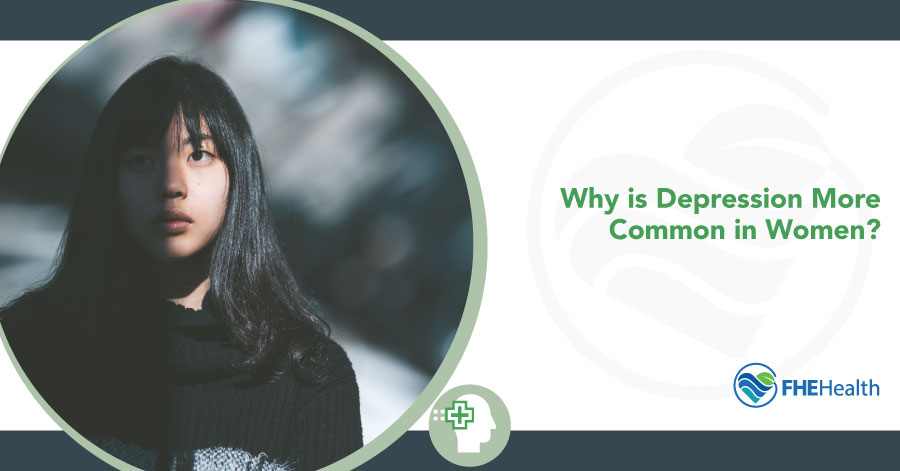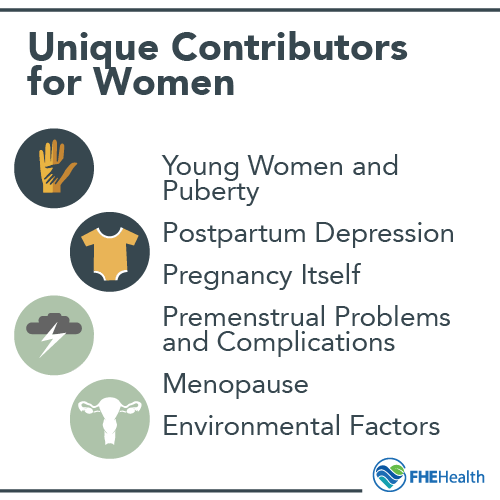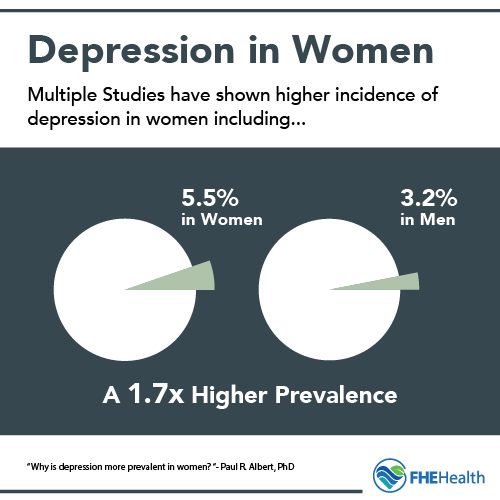
Why do women suffer from depression more than men do? Depression, which is both treatable and common, seems to impact women’s mental health more than men. One study, published by the National Institutes of Health, found that 1 in 10 women in the United States has symptoms of depression. This is about twice as many women as men.
Factors Contributing to Higher Depression Rates in Women
 There are some key reasons why women are more likely to suffer from moderate to severe depression than men.
There are some key reasons why women are more likely to suffer from moderate to severe depression than men.
Young Women and Puberty
Depression doesn’t just happen to adults; young women and teens can also suffer from depression. One key reason for this happens at puberty. The changes in hormone balance during this time can increase the risk of developing early-onset depression.
It’s important to note that mood swings, which are typical in both boys and girls going through puberty, aren’t necessarily indicative of a problem. Rather, it’s more likely that depression occurs as a result of conflicts with parents, emerging sexuality and pressure in school, sports and other areas. In some cases, identity issues can also play a role.
What’s different between boys and girls is that girls tend to go through puberty earlier. As a result, they have to deal with these complex feelings and thoughts at a much younger age, when their brains are less fully developed. Some researchers believe this gender age gap carries on through adult life as well.
Postpartum Depression
It’s not uncommon to see signs of depression in women after they give birth. Postpartum depression is a rather common occurrence. During the first few weeks after giving birth, the body’s hormones are trying to regulate to new needs.
This can be made worse by numerous complications that occur after pregnancy, such as trouble breastfeeding, difficulty losing weight, new responsibilities in caring for the child and lack of sleep. A limited amount of social support can also cause concerns. Women who have a child with special needs or complex medical conditions may be at an increased risk of developing postpartum depression.
This type of depression in women is quite serious, and symptoms tend to be very intense. Women may feel deep sadness and worry, even though they’re happy to have their new child in their lives.
Sometimes, these postpartum feelings, often called the baby blues, go away within a matter of days. Other times they linger. When they do, it’s important to seek out help from a doctor to ensure you remain safe and healthy.
Pregnancy Itself
While postpartum depression is more severe and common, it’s not unusual for women to also experience bouts of depression during pregnancy. Pregnancy creates significant changes in hormones within the body to help encourage the baby’s growth and development. However, these changes can affect mood.
Women who struggle to become pregnant may be at a higher risk of developing pregnancy-related depression, especially if they are receiving hormone injections to boost fertility.
While the change in hormones is one factor, pregnancy, especially an initial pregnancy, can also create significant life changes, which can impact depression risk. This may include things like a woman’s self-esteem concerns due to their ever-growing belly and pain and discomfort as the pregnancy goes along.
Some women may feel anxiety about the baby. Others may be unable to work and worry about financial issues.
If, during pregnancy, you feel as though you cannot go on or you have thoughts of harming yourself or your child, it’s imperative to get immediate medical care. This is an emergency.
Premenstrual Problems and Complications
Though some people joke about “that time of the month,” for many women, this is when symptoms of depression increase dramatically. Premenstrual syndrome, or PMS, is a physical factor in many women’s lives. During this time, their bodies are changing significantly.
Physical symptoms, such as headaches, bloating, anxiety, irritability and breast tenderness, are common. Some also experience bouts of mild to moderate depression. Generally, these symptoms are short-lived and disappear within a few days.
Sometimes, though, premenstrual dysphoric disorder, PMDD, occurs. This is a specific type of depression related to hormonal changes occurring during premenstrual cycles. If your PMS disrupts your job, relationships, ability to cope with daily tasks or other areas of your life, it’s essential to get help for this type of depression in women.
Menopause
Menopause and perimenopause, which occurs in the months prior to menopause, are other times when the risk of developing depression increases for many women. This period of transition means that, again, hormone levels are changing significantly.
Early in perimenopause and then again once menopause is over, estrogen levels drop significantly. When this happens, it may cause mood swings, anxiety and poor sleep quality.
This hormone change can also cause weight gain, which may impact a woman’s self-esteem. Changes in daily life can also play a role. For some women, the realization that they cannot have any additional children can be difficult.
For those who experience significant depression during this transition, doctors may recommend the removal of the ovaries. This can help to regulate hormones more quickly.
Environmental Factors
Why is depression in women more common than men when it comes to the environment they live in? Many factors may play a role.
Status: Women face a harder time with job promotion, recognition of accomplishments and securing resources than men in many areas. This can affect their quality of life.
Co-Occurring Mental Health Disorders: Women are more likely to experience other mental health disorders, such as eating disorders and anxiety. Some also experience substance abuse disorders.
What Does This Mean for Women?
 The effects of these higher rates of depression in women can be profound. Clinical depression, which can occur in those with or without a genetic predisposition, increases the risk of suicide.
The effects of these higher rates of depression in women can be profound. Clinical depression, which can occur in those with or without a genetic predisposition, increases the risk of suicide.
Women who struggle with depression may be at a higher risk of being abused. Women who don’t seek help may live for years with untreated depression. It doesn’t usually improve on its own.
For women who believe they have depression, it’s essential to get help. This includes those who have feelings of hopelessness, guilt and shame and those who have lost excitement or joy in things they used to love. If you have trouble remembering things or struggle to get enough sleep, you may also be at risk.
Getting treatment for depression can help to reduce symptoms and improve quality of life. Treatment may include counseling, group therapy, and medication, depending on the situation. In some cases, treatment can also save a life.
Are You Ready to Get Treatment for Depression?
If you’re a woman with depression, no matter what’s happening in your life, you need to focus on your needs first. To do that, call FHE Health and speak to our compassionate, experienced counselors. Our team is always available when you call 833-596-3502.






